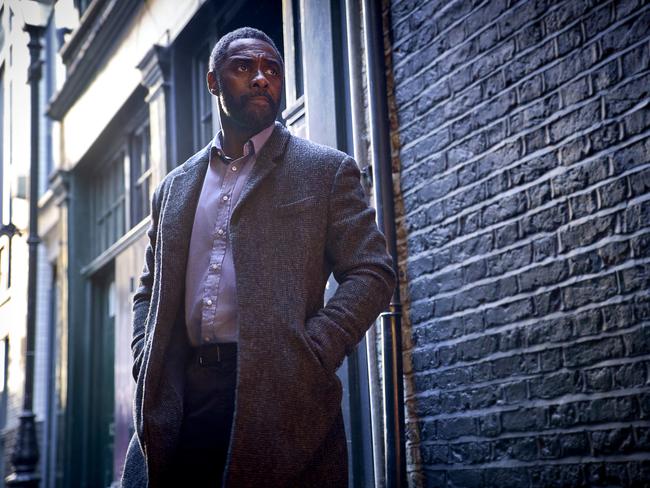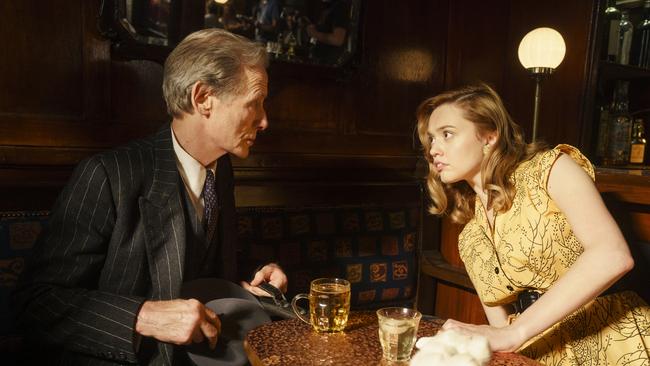
It’s intriguing when an actor from left field is cast as a psycho killer, to use the term popularised by the 1980s rock band Talking Heads.
There are numerous examples but two Oscar-winning performances come to mind: Anthony Hopkins as Hannibal “the Cannibal” Lecter in The Silence of the Lambs (1991), and Javier Bardem as sociopathic hitman Anton Chigurh in No Country For Old Men (2007).
The English actor Andy Serkis, the voice of Gollum and other CGI creations, has his turn in the crime thriller Luther: The Fallen Sun.
I don’t think he’ll win an Oscar but he does bring something different to the role of David Robey, a London financial trader with a sinister side.
This 129-minute film is a feature-length continuation of the BBC police drama Luther (2010-2019), starring Idris Elba as the vigilante detective John Luther.
It is written by Neil Cross, who created the series, which has run for five seasons, and directed by Jamie Payne, who directed season five.
Robey announces his intentions by singing, badly, the Diana Ross song I’m Coming Out: “I’m coming out / I want the world to know/ Got to let it show.”
What he wants to show is sadism and cruelty. It’s meted out, slowly, as old-fashioned torture and death but it’s made possible, and shared with other twisted minds, by digital technology.
The film opens with families rushing to a mansion somewhere in London after receiving voice messages from missing loved ones on their mobile phones.
What they find on arrival is horrible. Then it becomes far worse.
Robey, grinding his teeth as he smiles and smiles, says it’s but a warm-up for what he has planned next.
Out to stop him is Detective Chief Inspector Luther. However, he has two problems: one, he’s no longer a DCI because, two, he’s in prison after being convicted of a range of crimes.
It was Robey who put him there. Yet Luther at no point denies the charges, and this is what makes him compelling.
His idea of justice, like Dirty Harry’s, does not stand up in court.
Unlike Dr Lecter, Luther cannot solve crimes from behind bars so we soon have a plot development that requires a significant suspension of disbelief. There are more to come, but it’s worth rolling with them.
The new DCI, Odette Raine (Cynthia Erivo), is on the case, as is Luther’s friend and former boss Detective Chief Superintendent (ret.) Martin Schenk (Dermot Crowley).
As a TV show, Luther is more Wire in the Blood than Midsomer Murders, and this film version goes to some places with no light. One of the most confronting scenes shows not what Robey is doing to his victims but the satisfied looks on the faces of the people, in their homes, on their laptops, who have paid to watch him do it.
Elba owns this role, physically and mentally. He shoulders his way through the seedier streets of London, resolved to do, as he puts it, “what has to be done”.
Along the way there are a couple of 007 jokes, including one involving a martini. Elba, once considered a frontrunner as the next James Bond, has ruled himself out of the role.
Fans of the conflicted, melancholic John Luther, and I am one, will like seeing him back on the beat. This movie is more or less an extended episode of the series and there’s nothing wrong with that.
-
Living (PG)
In cinemas
★★★★½
The bittersweet drama Living, starring Bill Nighy, is adapted from Akira Kurosawa’s 1952 film Ikiru (To Live), which in turn was inspired by Leo Tolstoy’s 1886 novella The Death of Ivan Ilyich.
These are big shoes to fill and they are filled magnificently, not least due to the quietly powerful screenplay by a living literary great, the Nobel laureate Kazuo Ishiguro.
What stirs our emotions when we sit in cinema can be general – a movie about the Holocaust, say – or more personal. As I watched Living, directed by South African filmmaker Oliver Hermanus, there were moments when tears were almost shed.
Some people tell me they think Martin McDonagh’s The Banshees of Inisherin is too sad. Living is sadder and the feelings and thoughts it brings to the surface make it a special film for this viewer.
The setting is England in 1953, a time and place when people dressed properly (credit to Oscar-winning costume designer Sandy Powell) and called each other Mr, Mrs and Miss.
The main character, Mr Williams (Nighy), is, as in Kurosawa’s film, a public servant, in this case a senior official at the public works department. In Tolstoy’s novella, he is a judge.
What the three have in common is terminal illness.

Mr Morrison, a widower, lives with his adult son and daughter-in-law. The war has been over for less than a decade and the stiff upper lip is very much still in place.
He stands in front of a mirror and rehearses what to tell his son. “It’s a bit of a bore, really …” It is a devastating moment, with Nighy showing, as he does throughout, why he has received an Oscar nomination for this performance.
Whether he is able to break the news to his son is for viewers to find out. He does tell a stranger: an insomniac playwright (a wonderful extended cameo by Tom Burke) he meets in a seaside town that looks like Brighton.
It’s here that the title asserts itself. Mr Williams, who is on an unannounced break from the office, says he has six months to live, “eight or nine at a stretch”.
Six months is not long, the playwright agrees, “but it’s enough time to live a little, if you want to”. They spend a night on the town and so begins Mr Wiliamson’s bid to escape, for the time he has left, the buttoned-down, pinstriped daily existence so he can live a different life.
When we first meet Mr Williams, bowler hat in place, the song that comes to mind is The Jam’s Smithers-Jones from 1979. Like Smithers-Jones, he catches the Waterloo line to the office. “Pinstripe suit/ clean shirt and tie. Stops off at the corner shop/ to buy The Times.”
How far Mr Williams goes in this different life – or how far people suspect he goes – becomes a matter of gossip in his conservative local community.
A young woman, Miss Harris (a terrific Aimee Lou Wood), is involved. She was a colleague at the department but left to work in a fancy restaurant.
He tells her that, on spotting her one morning in Piccadilly, he thought, “If only to be alive like that for one day.” The scenes between them are beautiful.
And while this is a sad film, there are flashes of humour. One day, over lunch, she tells him the nicknames she made up for him and the other men at the department.
These hitherto private monikers are witty, and he, with knowledge she does not have, smiles when told his own: Mr Zombie, “dead but not dead”.
The scenes within the bureaucracy are also funny in a we’ve-all-been-there way. Mr Williams, at the outset, is considered an aloof “old man” by his junior colleagues, who demur to him. One of them, Mr Wakeling (an excellent Alex Sharp), is new on the job and he is surprised and disappointed as he watches the red tape ravel around a group of women seeking approval for the construction of a children’s playground.
They start out in public works and are shifted from department to department until they end up at cleaning and sewage. The bureaucrats there send them back to … well, you can guess.
There is a dramatic shift halfway through this 102-minute film. It is not a plot twist. What happens is expected but its timing sends this movie in another direction that reveals what counts most in Mr Williams’ different life.
He tells Miss Harris that he grew up wanting to be no more than a “rank-and-file gentleman”. He has achieved that aim and now, as he considers the life he has led so far, he wonders “How did it happen?”
Yet this is not a movie about looking back with regret. It is about looking forward – even if it’s only for six months – and working out how to live a valuable life.
Nighy deserves an Oscar for this role. So do Colin Farrell in the Banshees of Inisherin, Austin Butler in Baz Luhrmann’s Elvis and Brendan Fraser in The Whale. There can be only one winner but these three films, along with others in the nominations such as Todd Field’s Tar, are proof that fine filmmaking is far from dead.




Luther: The Fallen Sun (MA15+)
In cinemas now. Netflix from March 10
★★★